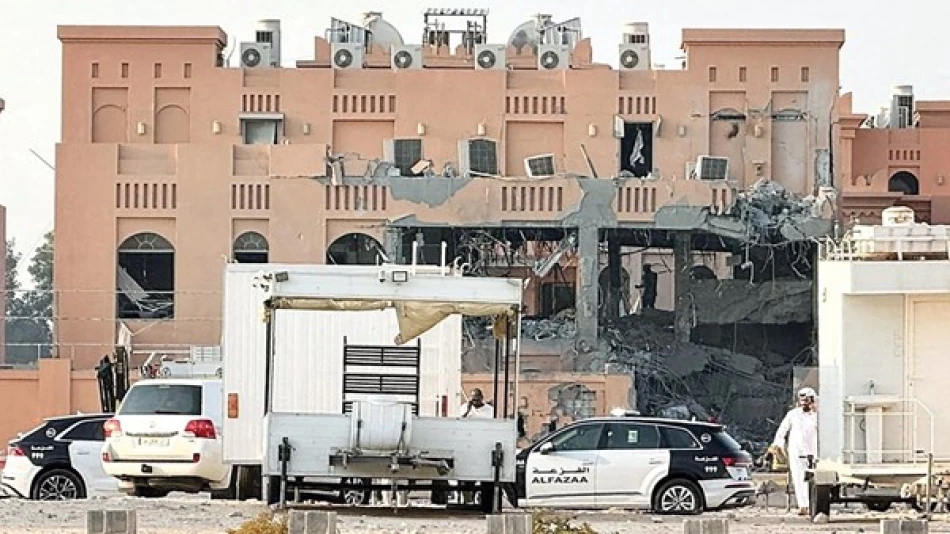
Global Outcry Condemns Israel's Strikes on Doha: Escalating Tensions in the Middle East
Israel's Strike on Qatar Sparks Global Diplomatic Crisis as Ceasefire Mediation Hangs in Balance
Israel's unprecedented aerial strikes on Qatar Tuesday have triggered a cascade of international condemnation, with Arab leaders, the United States, and European powers denouncing what they call a "criminal act" that violates international law. The attack on Qatar—a key mediator in Gaza ceasefire negotiations—threatens to derail diplomatic efforts and marks a dangerous escalation that could reshape Middle Eastern alliances.
Arab World Unites in Condemnation
The strike has produced a rare moment of Arab unity, with traditional rivals setting aside differences to condemn Israel's actions. Saudi Crown Prince Mohammed bin Salman personally called Qatar's Emir Tamim bin Hamad Al Thani, describing the attack as a "criminal act" and "blatant violation of international laws and norms." The Kingdom pledged to put "all its capabilities" behind Qatar's security measures.
Egypt's presidency issued a strongly-worded statement calling the aggression a "dangerous precedent" and an "unacceptable development," while Jordan's King Abdullah II declared that "Qatar's security is Jordan's security" and called for immediate international action to halt such violations.
Arab League Highlights Qatar's Mediation Role
Arab League Secretary-General Ahmed Aboul Gheit emphasized Qatar's crucial diplomatic efforts, noting that the country "has sought since the beginning of the Gaza war, along with Egypt and the United States, to mediate for a ceasefire and has made remarkable and sincere efforts in this regard." This framing positions the strike not just as an attack on Qatar, but as an assault on peace negotiations themselves.
Western Allies Distance Themselves from Israeli Action
The Biden administration's immediate disavowal signals a significant diplomatic rift. White House spokesperson Caroline Levitt stated that President Trump "did not endorse Israel's decision to carry out strikes on Qatari territory," describing Qatar as a "strong ally and friendly state" and expressing "significant discomfort" with the attack's location.
European leaders were equally critical. French President Emmanuel Macron declared the attacks "unacceptable regardless of their motives," while British Prime Minister Keir Starmer warned of escalation risks. German Foreign Minister Johann Wadeful went further, arguing the strike "not only violates Qatari territorial sovereignty but also endangers all our efforts to secure the release of hostages."
Strategic Implications for Regional Diplomacy
Qatar's unique position as a mediator between Hamas and Israel has made it indispensable to ceasefire negotiations. The country hosts the largest U.S. military base in the Middle East while maintaining channels to groups Washington considers terrorist organizations. This balancing act has proven crucial in previous prisoner exchanges and humanitarian corridors.
The timing appears particularly damaging to ongoing hostage negotiations. UN Secretary-General António Guterres condemned the "flagrant violation of Qatar's sovereignty," specifically noting Qatar's "extremely positive role in reaching a ceasefire and releasing all hostages."
Iran Seizes Diplomatic Opening
Iran's condemnation of the strikes, describing them as a "blatant violation of all international rules," positions Tehran as defender of sovereignty principles—a narrative that could complicate U.S. efforts to maintain Arab support for containing Iranian influence.
Potential Consequences for Middle Eastern Order
The strike represents a significant gamble by Israel, potentially sacrificing its most important diplomatic channel for unclear military gains. Qatar's role in facilitating dialogue extends beyond Gaza to broader regional issues, including Afghanistan evacuation efforts and energy diplomacy.
For Gulf states, the attack raises uncomfortable questions about sovereignty guarantees. Despite normalizing relations with Israel through the Abraham Accords framework, the UAE and other Gulf nations now face pressure to demonstrate that such partnerships don't compromise their territorial integrity.
The unified condemnation suggests Israel may have miscalculated the diplomatic cost. With ceasefire negotiations at a critical juncture and regional tensions already elevated, the strike on Qatar could prove a strategic error that strengthens Iran's position while weakening Israel's diplomatic flexibility in future crises.
Most Viewed News

 Layla Al Mansoori
Layla Al Mansoori






